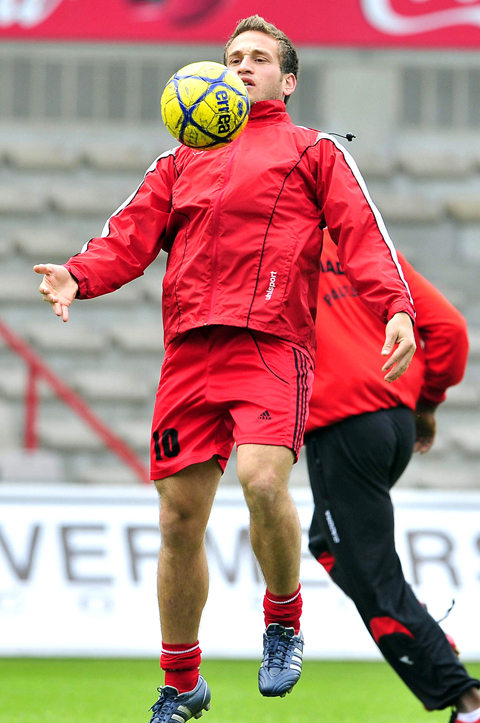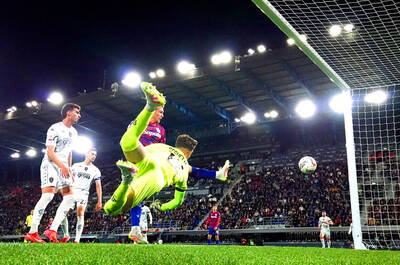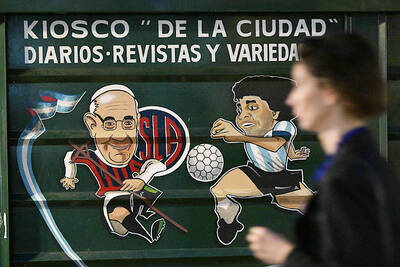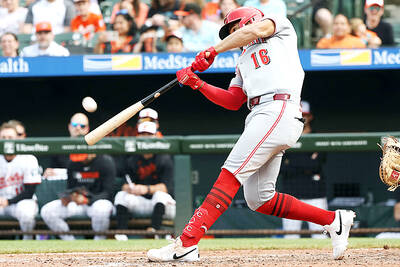Izzat Hamzeh couldn’t help the smile on his face on Tuesday as he watched his soccer team practice. After all, the Palestine national team coach had actually managed to get a squad together.
While the biggest concern for most national team coaches often involves injuries to star players, the problems facing Hamzeh is usually of a more basic nature — getting all his players out of the Gaza Strip and West Bank for away matches.
This time, he achieved the feat of getting his team together with 24 hours to spare, ahead of their friendly against local team FC Brussels.

PHOTO: AFP
“This is one of our major victories, that under all these circumstances we still manage to operate,” he said.
The match on the theme “A Goal for Peace” is organized by the United Nations Relief and Works Agency for Palestine Refugees in the Near East (UNRWA) and marks that organization’s 60th anniversary.
But instead of a normal squad of 22, Hamzeh had to be content with 16. And seven of those from the Gaza Strip needed three days to get to Belgium, held up by Israeli checkpoints and administrative burdens to get travel permits, he said.
It leaves him precious little time for tactical preparations.
But, he said, he doesn’t need to spend any time on motivational speeches.
“Imagine somebody who came here and spent three days on checkpoints,” he said. “He doesn’t need motivation. He is already motivated.”
The players were not available for interviews on Tuesday.
Football is still played in half of the Palestinian territories, with the West Bank maintaining a league, while players in Gaza, at the other side of Israel, have been grounded. There are heavy travel restrictions between the two parts.
During the three-week Israeli offensive against rocket squads in mid-January, more than 1,400 Palestinians were killed, a Palestinian human rights group’s figures showed. Hamzeh remembers making phone calls to find out if some players were hurt, or worse. Two former players on the Palestinian national team were killed, he said.
And when it comes to away matches, things don’t always work out as well as this week.
The Palestinians missed a World Cup qualifying game in Singapore in late 2007 because of Israeli travel restrictions. They were eliminated in the first round of qualifying.
Such setbacks have taken their toll.
Palestine reached their highest FIFA ranking of 115th in 2006, when they made the penultimate qualifying round for the Asian Cup, but have now fallen to 171st. Draws against Nepal and Kyrgyzstan didn’t help, and Hamzeh has been increasingly criticized at home.
For the Brussels friendly, Hamzeh said he was without four of his best players, as professional clubs in other nations are not obligated to release players for such games.
Still, playing a match in Europe again has the freshness of a new beginning.
Hamzeh himself was born in a refugee camp outside Jericho in 1957 and moved to another in Jordan during his youth. He soon discovered the joys of soccer.
“It was our life because there was nothing to do after school, except playing on sandy pitches,” he said. “We collected money to buy a small ball and this ball bound us as a neighborhood.”
There is a similar bond now, which means Hamzeh doesn’t have to worry about any political infighting between players of the West Bank’s Fatah and Gaza’s Hamas.
“On the level of players: No Fatah, no Hamas, no political issue,” Hamzeh said. “They are one team. Nobody talks about it.”

Bologna on Thursday advanced past Empoli to reach their first Coppa Italia final in more than half a century. Thijs Dallinga’s 87th-minute header earned Bologna a 2-1 win and his side advanced 5-1 on aggregate. Giovanni Fabbian opened the scoring for Bologna with a header seven minutes in. Then Viktor Kovalenko equalized for Empoli in the 30th minute by turning in a rebound to finish off a counterattack. Bologna won the first leg 3-0. In the May 14 final in Rome, Bologna are to face AC Milan, who eliminated city rivals Inter 4-1 on aggregate following a 3-0 win on Wednesday. Bologna last reached the

If the Wild finally break through and win their first playoff series in a decade, Minnesota’s top line likely will be the reason. They were all over the Golden Knights through the first two games of their NHL Western Conference quarter-finals series, which was 1-1 going back to Minnesota for Game 3 today. The Wild tied the series with a 5-2 win on Tuesday. Matt Boldy had three goals and an assist in the first two games, while Kirill Kaprizov produced two goals and three assists. Joel Eriksson Ek, who centers the line, has yet to get on the scoresheet. “I think the biggest

From a commemorative jersey to a stadium in his name, Argentine soccer organizers are planning a slew of tributes to their late “Captain” Pope Francis, eulogized as the ultimate team player. Tributes to the Argentine pontiff, a lifelong lover of the game, who died on Monday at the age of 88, have been peppered with soccer metaphors in his homeland. “Francisco. What a player,” the Argentine Football Federation (AFA) said, describing the first pope from Latin America and the southern hemisphere as a generational talent who “never hogged the ball” and who showed the world “the importance of having an Argentine captain,

Noelvi Marte on Sunday had seven RBIs and hit his first career grand slam with a drive off infielder Jorge Mateo, while Austin Wynn had a career-high six RBIs as the Cincinnati Reds scored their most runs in 26 years in a 24-2 rout of the Baltimore Orioles. Marte finished with five hits, including his eighth-inning homer off Mateo. Wynn hit a three-run homer in the ninth off catcher Gary Sanchez. Cincinnati scored its most runs since a 24-12 win against the Colorado Rockies on May 19, 1999, and finished with 25 hits. Baltimore allowed its most runs since a 30-3 loss to